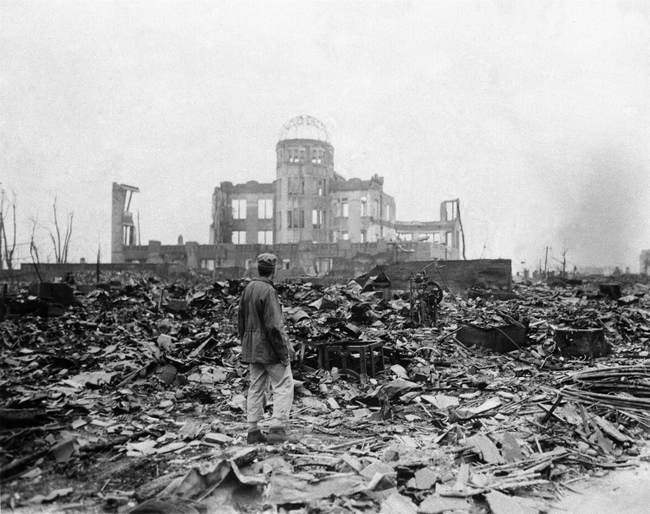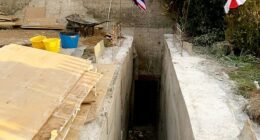
As Japan acknowledges the 80th anniversary of the dropping of the atomic bomb on Hiroshima with solemnity and sorrow, a growing number of Japanese citizens question the nation’s 80-year commitment to pacifism.
“We are now at a turning point,” said Noriyuki Kawano, the director of the Center for Peace at Hiroshima University. “Hiroshima is Hiroshima, but if Japan is to face reality, Hiroshima may become isolated.”
Japan’s history of pacifism has colored its politics since the end of World War II. The U.S.-imposed constitution forced the country to renounce war and prevented it from having a military except for self-defense, but today, Japan is at a crossroads. Russia, North Korea, and China are all nuclear powers, and the U.S. guarantee of Japan’s security is fraying around the edges.
Japan certainly has the capability to build a bomb. NBC News reported 10 years ago that Japan has “the material and the means to produce nuclear weapons within six months, according to some estimates.” Analysts call it Japan’s “bomb in the basement.”
“Japan now has 9 tons of plutonium stockpiled at several locations in Japan and another 35 tons stored in France and the U.K.,” according to NBC. That’s enough for 5,000 bombs.
With China becoming a larger threat and the unpredictability of North Korea, many younger Japanese people, especially those with no memory of Hiroshima, think the time is now to abandon their pacifist past and embrace a different future.
According to surveys by the Center for Peace, the number of Japanese students who believe in nuclear deterrence has increased in recent years. “People are realizing that peace will not come just by praying,” said Masanari Tade, the son of a Hiroshima survivor who died at 50.
“The lack of peace, the lack of nuclear nonproliferation, in and of itself, this is proof that the symbol of Hiroshima as a peace city has failed,” he said.
For context, Mr. Tade doesn’t believe the stories of Japanese atrocities during the war.
New York Times:
Mr. Tade, of the ultranationalist bloc, thinks that Japan needs to move on from a war that ended 80 years ago — even as others condemn Japan for a lack of contrition for the atrocities committed by its Imperial Armed Forces.
Like other nationalists, some of whom have a growing voice in Japan’s ruling party, Mr. Tade dismisses documented war crimes by Japanese forces — from the Nanjing Massacre and the enslavement of women sexually as so-called “comfort women” to biological warfare experiments — as concocted by a Western-supported intelligentsia.
“It’s a Japanese guilt theory, that Japan started the war because it was bad and so it had to suffer damage,” he said. “There is a sad reality, a logic used to justify the bombing.”
Japanese schools have only just begun to teach about their nation’s atrocities in the last 20 years. Even now, textbooks leave a lot out. South Korea is extremely sensitive to the lack of transparency of Japan about its war crimes in South Korea, including the use of 200,000 so-called “comfort women” that the Japanese army forced to service its occupying soldiers.
For its part, Japan wants the U.S. to acknowledge that the dropping of the atomic bomb on Hiroshima and Nagasaki was a war crime and is demanding an apology. In 2016, Barack Obama became the first U.S. president to visit Hiroshima, and while he highlighted the devastation that nuclear weapons cause, he never apologized for the U.S. using the bomb to end the war.
Takashi Hiraoka, a former mayor of Hiroshima, told the New York Times, “We must hold America responsible.”
“In other words,” he added, “the first step in eliminating nuclear weapons is making them acknowledge that America’s strategy of dropping bombs on Hiroshima and Nagasaki was wrong.”
There were alternatives to ending the war, including a naval blockade that would have starved millions and a U.S. invasion that would not only have killed a million Japanese but also resulted in as many as half a million U.S. deaths. To say it was “wrong” is simple sophistry.
The Japanese Diet, the country’s parliament, recently voted for a 9.7% increase in defense spending. Japan already spends around $57 billion on defense, ranking ninth globally. Japan’s military doctrine has gradually moved from total defense to a more aggressive posture. They are rapidly expanding their navy in response to the Chinese naval buildup.
There are 50,000 American troops in Japan and another 30,000 in South Korea. The United States has sold Taiwan more than $50 billion in arms since the 1950s. Clearly, we have a huge stake in defending the region from both Russia and China.
A better-armed Japan would be a tremendous asset to our regional strategy.
Help PJ Media continue to tell the truth about the Trump administration’s accomplishments as we continue to usher in the Golden Era of America. Join PJ Media VIP and use promo code FIGHT to get 60% off your membership.







